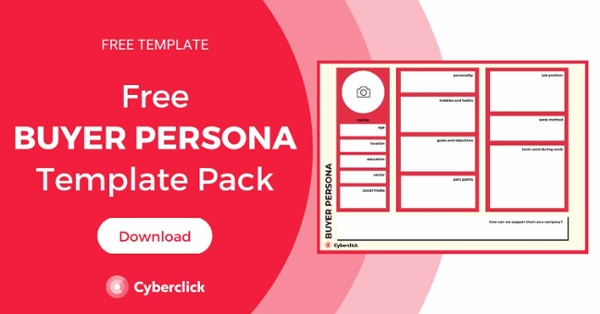By David Tomas, on 30 December 2021
Managing customer data is one of the biggest challenges in digital marketing. If you’re looking to effectively manage your customer data, a customer data platform may be the solution for you.
This technology consists of a platform designed to solve the problems of integrating, labeling, and storing customer data. By implementing it, you can have a holistic and uniform view of all customer actions in one streamlined data platform which provides more information to develop and execute your strategies.
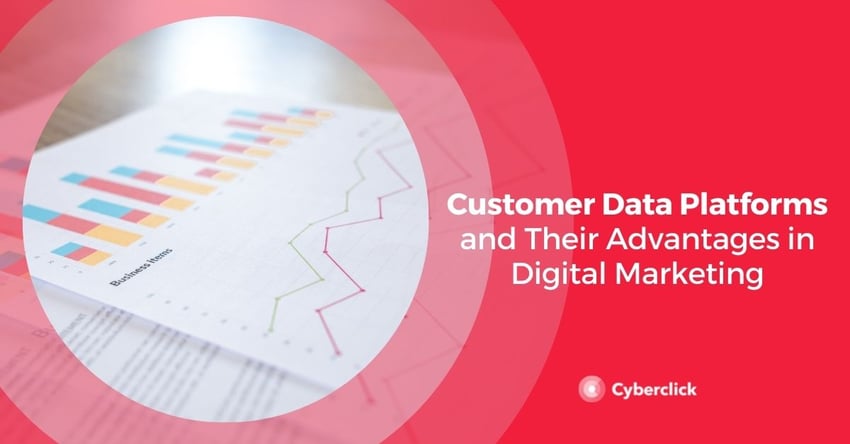
What Is Customer Data and How Is It Related to Digital Marketing?
Nowadays, companies have more data than ever before. There is transactional, demographic, and behavioral data and all of this data has different levels of personalization, from impressions and purchases specific clients have made, to the interactions they have had with your company.
The problem is that this data is normally isolated in silos for organizational or technical reasons, which makes it very difficult for companies to offer consistent customer experiences across different channels and devices.
Customer data is also evolving quickly. It is collected in real-time by social networks and web browsers. Data on people's preferences in things like tech, fashion, gaming, etc. is updated constantly and stored. Customer data can then be analyzed and used to adapt your organization's marketing strategy in order to get higher conversions and drive sales.
As advantageous as this is, it can also make it harder to analyze and extract key data points.
What Is a Customer Data Platform?
Once you are clear about the data you have, you can move on to define the platform. According to the Customer Data Platform Institute, a customer data platform is "a system controlled by a marketing team to create a unified database."
It is a system that tags and centralizes customer data from different channels and sources and enriches it to generate audiences and 360º profiles.
A defining characteristic of a customer data platform is the great diversity of data that can be stored and unified. Here are some common data sources.
Transaction and order data: ecommerce, administration, and sales systems generate data about client purchases, order and renewal dates, customer value, abandoned carts, returns, and more. All of this is very valuable information for marketing and sales initiatives.
Behavioral, web, and mobile data: this type of data is key to discerning the behavior and preferences of current and potential customers. It shows the products and categories they have looked at, as well as information on the number of pages visited per session, average session duration, and more.
Profile data: customers are at the center of every company. Therefore, knowing who they are and what they want leads to more effective marketing. You can enrich your lead generation forms to generate psychographic information around users' preferences.
Product data: Although this is not strictly customer data, it helps you have personalized, meaningful interactions with customers. Two basic examples of product data are inventory levels and pricing.
What Is Not a Customer Data Platform?
There are many digital marketing tools that provide a comprehensive view of your customer, so it's normal to be unclear about the differences between customer data platforms and other solutions. Here’s how to distinguish between them.
A customer data platform is not a CRM. CRM systems are designed to interact with clients and create profiles of them, but they work with limited data sources and do not combine as much information as a CDP can. The CRM focuses on identifiable personal data, while the CDP contains data about cookies or mobile devices.
A customer data platform is not a customer integration tool. CDPs are designed specifically for marketing and contain a lot of extra features, such as database creation and management, business intelligence, analytics, and more. Creating a similar solution from scratch would require a huge investment in budget and time, and comes with its own set of risks.
A customer data platform is not a delivery platform. Systems that interact with users on different channels are called "delivery platforms." For example, email marketing software, a web page, or a social network management platform. These systems are not part of the CDP but interact with it to send messages and collect data.
A customer data platform is not a data management platform (DMP). DMPs are designed to show ads and allow retargeting campaigns through cookies. They focus more on anonymous segments and categories than on individual users, and normally the information they contain expires after 90 days. In contrast, CDPs create consistent client profiles and store all the information of a single user in a single record.
A customer data platform is not a data warehouse. Normally, data warehouses are created and managed by IT teams. To access the data stored there, the marketing team has to contact IT, which can generate bottlenecks. In contrast, CDPs are designed so that the data is easily accessible and in a useful format for the marketing team.
7 Key Benefits of Customer Data Platforms
Offer a unique view of the customer. Customer data platforms are specifically designed to collect data from a wide variety of sources, unify it across all devices and channels and then make it available to other systems.
They allow companies to be more competitive. According to a Forbes study, 93% of marketing executives believe that using customer data for decision-making and campaign creation provides them with a substantial advantage. In addition, 53% believe that the transparency provided by these platforms makes it possible for their teams to react quickly to changes in markets or customer preferences.
They are agile. With a customer data platform you can create and connect a flexible technology stack that adapts to user behavior and evolving technological trends. By focusing on the database, CDPs give businesses the tools they need to collect data and use it to create better customer experiences.
They democratize data. The benefits of customer data are not exclusive to marketing. Business intelligence and customer service teams, for example, both depend on the availability of data to get ahead. CDPs democratize access to all this data.
Enrich relationships with partners and suppliers. The extended ecosystems of companies, including suppliers and partners, benefit from the implementation of a customer data platform. The main benefit of CDPs is to offer more segmented and higher-quality interactions with partners and suppliers.
They provide more effective customer and marketing experiences. Nowadays, people use multiple channels and devices but expect to have a unified customer experience on all of them. For example, they have a negative response to seeing an online advertisement for a product that they have already purchased in a physical store. Thanks to the unified view provided by the customer data platform, companies can better see and understand customer behavior and can create a more holistic customer experience. The payoff is an improved customer experience, which will lead to greater loyalty.
Improve operational efficiency. Previously, integrating different solutions and specific tools to view customer data consumed many resources. In contrast, CDPs centralize customer data with ready-to-use integrations. In addition, audience and business rules can be configured centrally and applied uniformly in the different tools.
The 5 Best Customer Data Platforms According to G2 Crowd
Now that you know exactly what a customer data platform is and how it can contribute to your digital marketing strategy, let's look at the specific solutions you can apply.
These are the five best-rated CDPs from users of the G2 Crowd Software Review Platform. All of them have received an average score of 4.5 stars or more.
1. Segment
This tool offers the client data infrastructure that companies need to be able to focus on their consumers. It allows companies to collect, unify, and connect their data with more than 200 marketing tools, analytics, and data warehouses.
Currently, Segment is the customer data platform used by thousands of companies, including Intuit, FOX, Instacart, and Levi's.
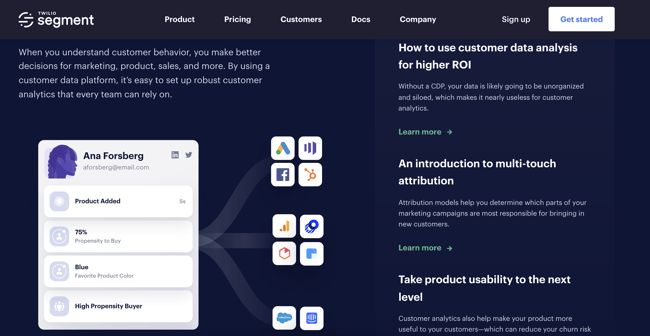
2. Insider
This tool helps digital marketers drive growth across all stages of the funnel, from acquisition to retention.
Insider leverages real-time predictive segmentation to deliver highly personalized customer journeys across a diverse array of channels including web, mobile, app, messaging, email, and more. Over 800 global enterprise, including Toyota, IKEA, Samsung, and Dominos, use Insider's AI and machine learning capabilities to drive personalized experiences for their customers.
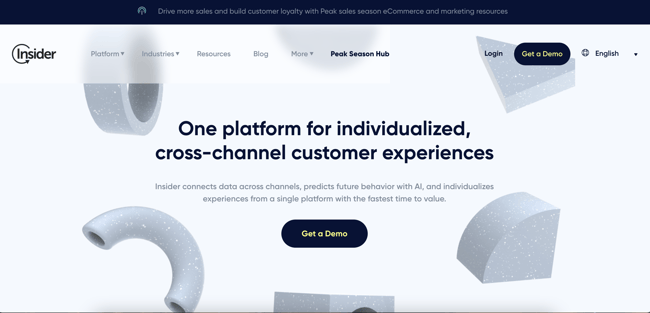
3. Optimizely
Optimizely is a CRM and marketing automation platform created for ecommerce brands.
This solution combines a unified view of the client, real-time marketing automation, and cross-channel attribution. Its goal is to empower B2C marketers to increase the number of repeat purchases and maximize the customer's lifetime value without the need to turn to the IT team.
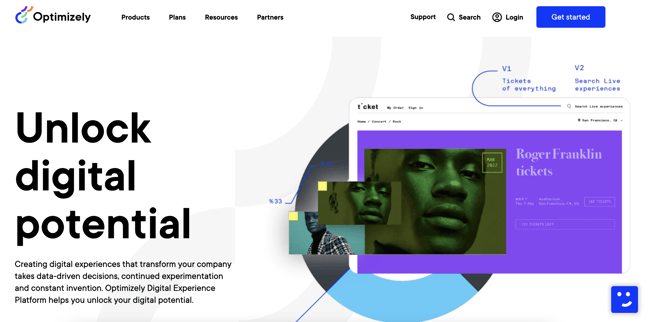
4. Hull
Hull is a customer data platform designed to allow sales, marketing, and customer success teams to understand the customer journey and to use customer data in a unified way. It empowers different departments to share and access the same information and work in harmony.
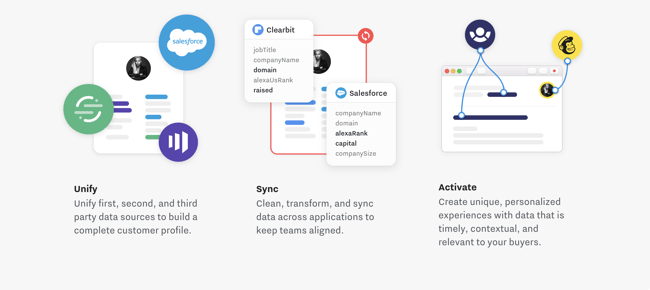
5. CaliberMind
CaliberMind connects your marketing tech stack to sales data so you can see how your funnel is converting. This tool emphasizes the value of quality data and data best practices.
It provides a unified view of customer data across all channels and platforms, which provides marketers unrestricted access to compelling customer insights.
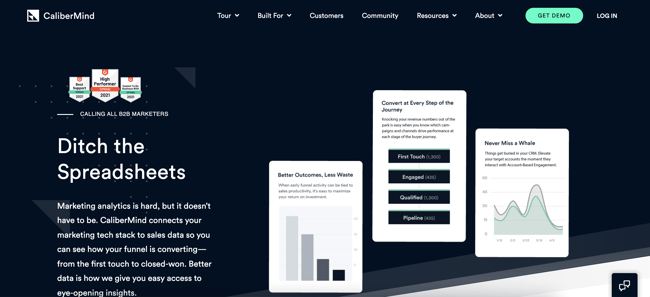
How to Use Customer Data in Your Marketing Campaigns
- Journey Map. Track your customer journey across different devices, from the first contact with the brand to conversion.
- Google Analytics. According to Nielsen, websites are the second biggest factor for determining consumer confidence in a brand, just behind recommendations from friends and family. So make it a point to clean up pages and inactive links, solve loading problems, and make sure you have Google Analytics fully integrated.
- Cart abandonment rate. This metric reflects the quality of the user experience on your website. Ensure a high quality UX by minimizing the abandonment rate. Evaluate the measures you have been taking to improve your website and what effect they have had over time. How can you move towards a model of continuous improvement?
- Customer opinions. Consumers rely on recommendations from friends and family. It’s in your best interest to make it very easy for them to leave comments, ratings, and reviews. You should also monitor user opinions on Amazon and social networks.
- Sales data per customer. This metric gives insights into sales trends. If you analyze the behavior of your loyal customers and cross-reference that data with product sales, you will be able to see which products work best and take advantage of this information in your marketing campaigns.
How to Use Customer Data Marketing in Your Pricing Strategy
When you hear "customer data marketing," you may think of large corporations with unlimited budgets. But, if you manage your firm through cloud-based platforms, chances are that the data you need around sales, customer profiles, inventories, orders, and suppliers is already within your reach. In short, you have everything you need to meet your KPIs.
How to Take Advantage of Customer Data in Your Promotional Campaigns
Formulate your pricing strategy. Promotional marketing campaigns are characterized by discounts and flash sales (like Black Friday). To formulate the right pricing strategy, calculate the destination cost of the products (including transportation, customs, warehouses, etc.) in advance. Customer data marketing allows you to know the precise cost at the destination of each product. It enables accurate calculation of margins so you can make attractive offers to customers and see profits soar.
Further considerations for pricing strategy. Before setting the pricing strategy, include cost-per-order, conversion ratio, and returns into your calculations.
Optimize your relationship with suppliers. If you have full data on the prices and margins you get from each supplier and product over time, you will be in a position to negotiate more successfully.
Demand and inventory scheduling. Analyze your stock reports to see when you have had inventory problems and why. Automate orders to suppliers to minimize the risk of finding yourself without stock.


